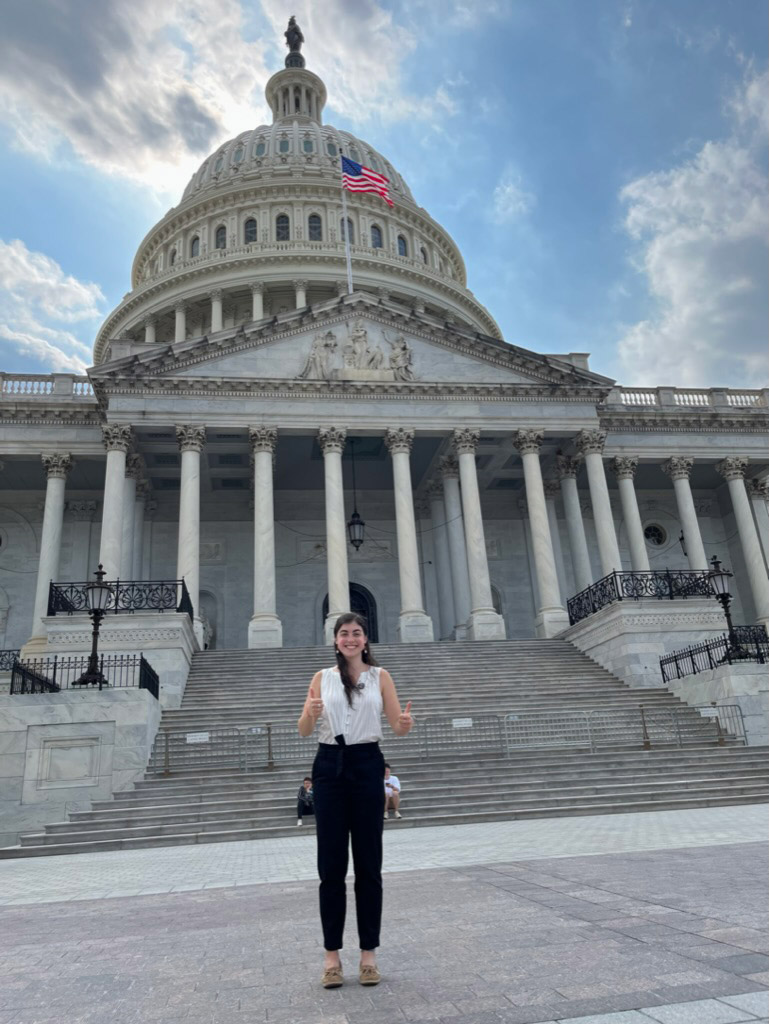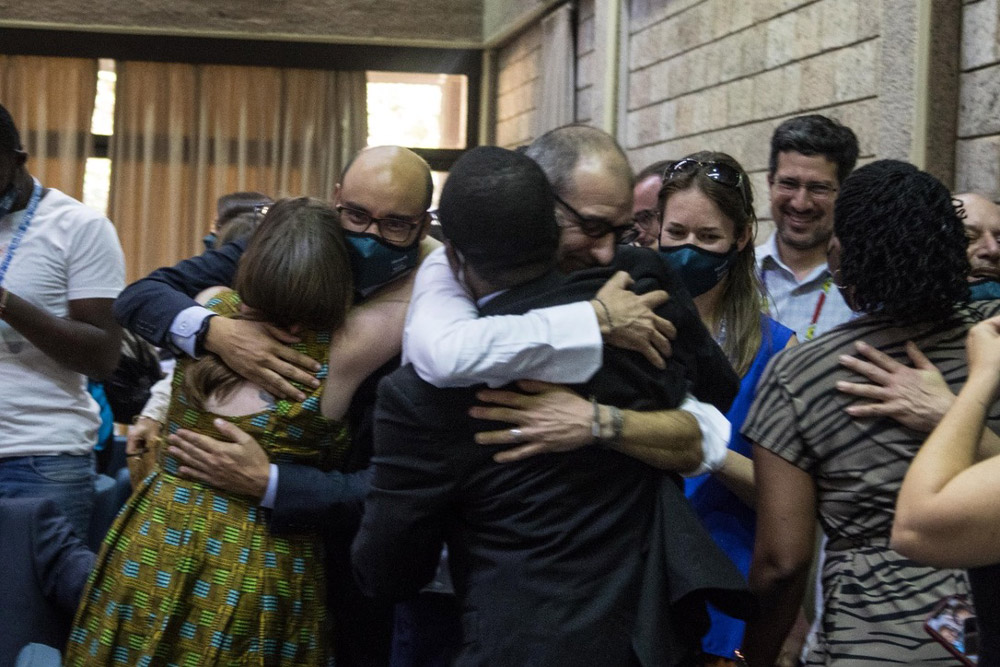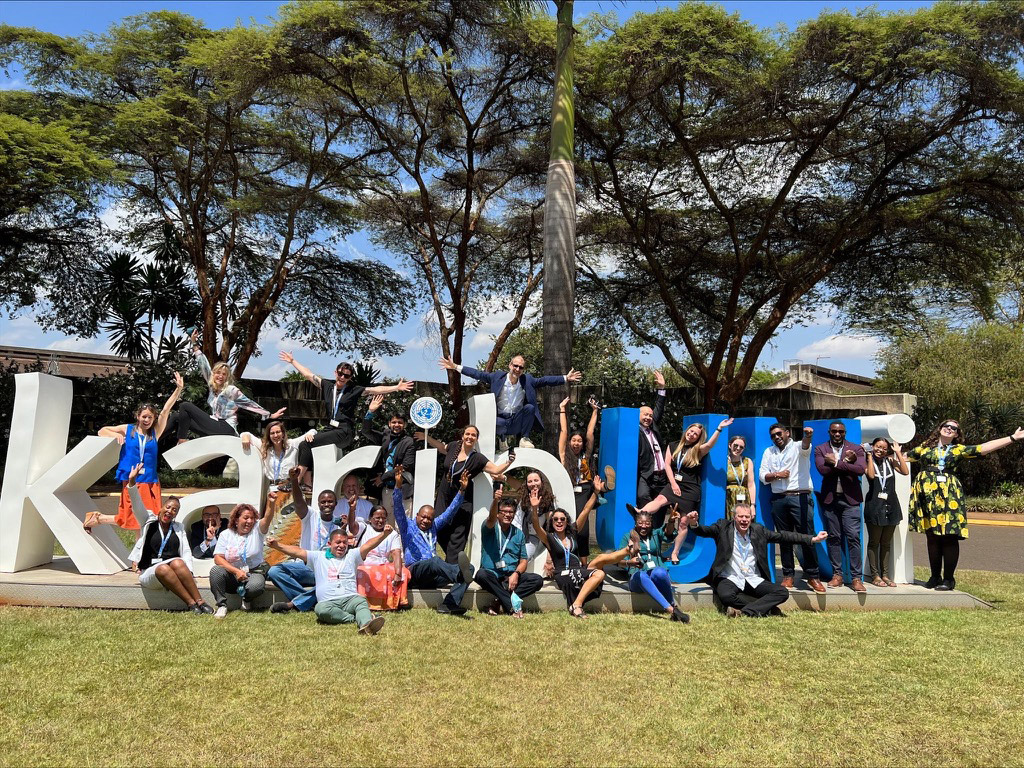My name is Rachel Radvany and I work for the Center for International Environmental Law (CIEL). CIEL uses the power of law to protect the environment, promote human rights, and ensure a just and sustainable society. We are an international organisation, but I am personally based in Washington, DC in the US.
I am 22, and after graduating from university last year, I joined CIEL to work on plastics policy. What brought me to work on plastics was the realisation of just how inextricably linked the plastics crisis is with other planetary crises. Though plastic has largely been framed publicly as a waste problem, it is also a climate problem, a health problem, and an environmental justice problem. It is not just about plastic in our oceans, it is about petrochemical facilities in people’s backyards and toxic chemicals in children’s toys and plastics as the Plan B for the fossil fuel industry. Breaking free from plastic means ending the toxic impacts of plastic all throughout its lifecycle.

Rachel Radvany at BFFP-US Lobby Week, June 2022, CIEL, 2022
On 12 August, we celebrate the International Youth Day, what would you say the engagement of youth on plastic is like?
There are incredible youth leaders around the world engaging on the issue of plastic. Activists, educators, scientists, and other young leaders are advocating for action and legislation all across the plastics life cycle – single-use plastic bans, development of reuse systems, restrictions on toxic chemicals and additives in plastic, and an end to the fossil fuel economy. Youth participation is key in these topics, as we are advocates for future generations. However, youth engagement could be enhanced.
At the United Nations Environment Program (UNEP), youth organisations engage through the Children and Youth Major Group, one of the nine groups in the Major Groups system, which allows young stakeholders to participate in UNEP processes and provide valuable input into discussions.
At the Open-Ended Working Group in late May, that set the stage for the Global Plastics Treaty negotiations, one of the dialogue sessions during the meeting focused on engaging youth in solving this crisis. One of the speakers pointed out the lack of young people at the meeting, and emphasised how important it is to actively engage youth in these processes in the future. Some countries are working to proactively include youth in these meetings, but this is not yet the norm. The voices of young people, especially those from the Global South, need to be heard in this conversation.
Why do you think the Global Plastics Treaty is so important?
The Plastics Treaty is an incredible opportunity to coordinate and catalyse global action on plastic pollution. CIEL and partners have been working with a robust coalition of civil society organisations to advocate for the most ambitious treaty possible.
BFFP shifts the narrative towards system change and exposing the roots of the plastics problem. The plastics supply chain is based on and deeply interlinked with global systems of exploitation and colonialism. Plastic production’s toxic impacts disproportionately harm frontline communities around the world, the toxic impacts of plastic use particularly affect women and children, and countries in the Global North export their plastic waste to Global South countries. It has become abundantly clear that in solving the plastics crisis goes hand-in-hand with tackling the other existential crises of our time.
The work that BFFP and its members have been doing around the world challenging the plastics industry and pushing for real solutions is laying the groundwork for an ambitious treaty. One of the best examples of this is seen in the mandate for the treaty: to address the “full life cycle of plastic,” not just plastic in the oceans. This is a huge shift in perspective, due in large part to the work of BFFP and its members.

#breakfreefromplastic celebrate mandate for the Global Plastics Treaty at UNEA 5.2, March 2022, CIEL 2022
Tell us: what’s to come from the process?
We are starting to gear up for the beginning of the actual treaty negotiations. There has been a lot of civil society engagement in the process thus far, but we have an opportunity to expand and reach more groups, organisations and individuals. It is expected that this treaty will address the plastic crisis from production to disposal, but it will take a collaborative effort to get some of the key provisions in there. Since plastic has so many dimensions and pathways for harm, it is so important to have as many diverse perspectives, including youth perspectives, as possible in these conversations, to make sure this treaty does its job at ending harm from plastic pollution. Supporting these negotiations and making it clear to delegations that there is a strong call out there for real, ambitious solutions will strengthen the treaty.
At the same time, this is a two year process, and plastic production is increasing as we speak. Action today on the national, regional, and local levels will be essential to supplementing the negotiations of the treaty – both to take action while the text is being written and also to provide examples for the treaty of real solutions working on the ground. Legislation, movement building, and narrative shift – all pillars of BFFP’s work – will all be indispensable for supporting the treaty work and of course for addressing the plastics crisis.

#breakfreefromplastic at UNEA 5.2, March 2022, CIEL 2022
Why do you think it is important for youth to be involved in this line of work (plastic and environmental protection in general)?
I recently learned that 42% of the world’s population is under the age of 25, which means that more than half of the plastics ever made have been produced in our lifetimes. We’ve been born into this system that is contributing to the planetary crises that are threatening our future and the ability of future generations to survive and thrive on this planet.
Young people are looking at spending the rest of our lives wrestling with difficult existential questions. It is pretty terrifying to think about living in a world with frequent natural disasters as the new normal, parts of the Earth becoming unlivable, babies being born pre-polluted with toxic chemicals, and more.
But at the same time, we are also seeing a shift in consciousness. For years, the plastic problem has been framed as a waste issue, with the onus and responsibility on the consumer to separate and recycle every piece of plastic we buy. But the narrative is shifting: people are finally recognizing we have been misled. Solving the plastics crisis will take more than individual actions, it will take a movement. And young people already are, and must continue to be an integral part of that movement.
What is the most outlandish statement, argument or activity you have seen or heard of in connection to plastic that you think everybody should know about?
Two quotes that I think everyone should hear are:
"There is serious doubt that [recycling plastic] can ever be made viable on an economic basis," and
"If the public thinks that recycling is working, then they are not going to be as concerned about the environment"
The first quote is from a 1974 plastics industry speech, and the second is from a former president of the Plastics Industry Association, an industry trade group. The plastics industry knew that recycling would not work, as the California Attorney General is currently investigating further, and they still tried to convince consumers of its benefits in order to deflect the blame for this crisis.
We would like to express our thank you towards Rachel Radvany for taking the time to reply to our questions.



